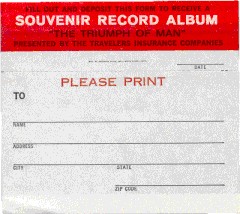 |
The red vinyl 33 1/3 RPM recording of "The
Triumph of Man" has become one of he most prolific and popular
collectibles from the Fair!
Read along and LISTEN to the soundtrack
of the The Travelers exhibit. Your on-line souvenir of
the Fair!
|
|
THE TRIUMPH OF
MAN
Man lives in a world of violence
and danger. History is a record of his struggle to survive. For
more than a million and a half years man has faced threats that
would have crushed a lesser being. He had to learn to use his
mind and discipline his body. He had to discover the world of
the spirit; develop science and technology; fight hostile creatures;
battle the elements; invent language; devise patterns of organization;
create art, architecture, literature and law. Slowly, at times
painfully, man has done all these things and more. True, he has
been capable of brutality and heedlessness. But he has inched
himself forward, picking himself up when he has fallen, repairing
the damage of destruction, pushing forward the frontiers of his
knowledge and insight.
Man has always striven to protect
what he loves. He has sacrificed himself for a principle or an
ideal; for his family or for his nation. His instinct for self
preservation has been altered by his determination to place the
objects of his love above himself. This is the triumph of man.
Over the ages there have been
certain crucial episodes which have changed the entire course
of man's history. The Travelers exhibit at the New York World's
Fair presents thirteen of the most significant of these events.
There is, of course, room for a difference of opinion as to the
merits of their selection. Literally thousands of important incidents
could have been presented with equal validity. It might, in fact,
prove highly entertaining as well as enlightening, for you to
list your own "top thirteen" of the most significant
"triumphs of man."
The purpose of The Travelers
exhibit is not to limit man's achievement but to celebrate it.
The episodes chosen are only symbolic. They are intended to enlarge
not circumscribe your awareness of history. In words, in music,
in visual artistry, we take you on the long journey your ancestors
have taken before you. It has been a hard, dangerous journey
but a glorious one. We hope you will enjoy this experience of
reliving The Triumph of Man.
|
|
Script by Robert P. Davis
Narration by Peter Thomas
Original Score by Frank Ledlie Moore
Performed by the Hartford Symphony Orchestra under the direction
of Fritz Mahler
|
 LISTEN! LISTEN! |
Welcome
to The Travelers Insurance Companies exhibit. You are about to
start on an unforgettable journey. A journey across two and a
half billion years of life on earth. You are going to walk through
the history of man. You will be with him as he meets his greatest
challenges. For this is your story. The Triumph of Man. |
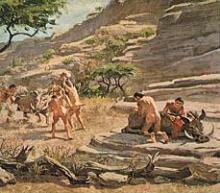
 LISTEN! LISTEN! |
This is
East Africa and man; your ancestor of a million and a half years
ago. He is ape-like. Clothed in coarse hair. But he stands upright.
He can think. He can learn. Early man uses rocks and clubs to
kill animals for food. He fashions small stone tools to help
him cut through tough hides. His world is violent; cruel. But
he survives. And this simple pebble tool is the beginning of
a technology which will take man to the stars. |
|
| 02. THE DISCOVERY OF FIRE |
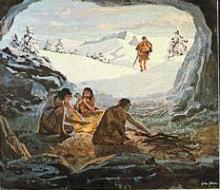
 LISTEN! LISTEN! |
For a million
years man faces life like the animals with only primitive tools
to help. Man has long known of fire but he runs from it in fear.
Then, man discovers he can use this energy. The small flames
light his night. He is able to cook. With fire man can now live
in colder climates and he inhabits more of the earth. In northern
China two hundred and fifty thousand years ago we find man gathering
his family around the fire. The hearth has remained, ever since,
the symbol of home. |
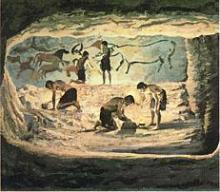
 LISTEN! LISTEN! |
A quarter
of a million years go by. Man is now aware of a world beyond
his own senses. A world of emotion. Imagination. The supernatural.
The succession of day and night; the rhythm of the seasons; the
pattern of life and death are mysteries he tries to understand.
These cavemen hope to exert a magical power over the animals
by painting their images. Out of man's desire to influence forces
beyond himself a simple religion arises in the hostile world
of twenty-five thousand years ago. |
|
| 04. THE BEGINNING OF AGRICULTURE |
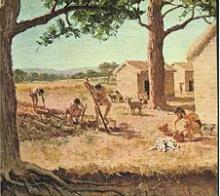
 LISTEN! LISTEN! |
Man moves
over hills and past far rivers in search of game. Then on a warm
spring day he plants his first seeds. The grain grows. And, again,
his life changes. With agriculture the hazardous nomadic life
of hunting flows into a more settled existence. It is eight thousand
years ago. Man is building small villages. He domesticates animals;
develops crafts like weaving and pottery. The earth yields. Man
stores his surplus, protecting himself against starvation. Society
becomes more complex as man begins to organize himself and those
around him. |
| 05. THE FIRST CITY INTRODUCTION |
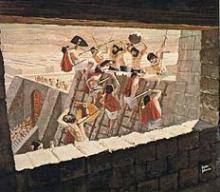
 LISTEN! LISTEN! |
You are
standing on a wall of the city of Ur in Mesopotamia four thousand
years ago. Great walled cities are man's answer to population
increase. Surplus grows into wealth and wealth encourages war.
Man attacks man. Ramparts shake. The clash of battle echoes through
long days of the Bronze Age. Man increases his power and knowledge.
He invents government, commerce, architecture, writing and taxes.
Over and over again he fights to protect what is his. And out
of destruction man rebuilds and moves forward. |
|
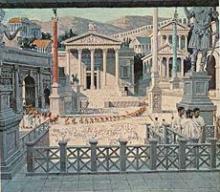
 LISTEN! LISTEN! |
Homer has
said his words. The Hebrew prophets have spoken. To the east,
whole civilizations have come and gone. Now the Roman Empire
spreads across the western world. It is a triumph of technology
and culture. Rome sets the pace for western civilization. Our
laws and the organization of our government go back to the days
of the Forum. But another great endowment emerges from these
years as the Apostles travel the Mediterranean bringing a new
message to man. It is a message of hope. Of a power stronger
than weapons. A wealth more lasting than the coins of Caesar. |
| 07. CIVILIZATION IN PERIL |
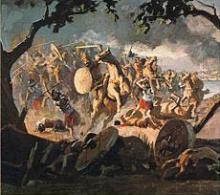
 LISTEN! LISTEN! |
These are
the Plains of Chalons in eastern France more than fifteen hundred
years ago. The Roman Empire is under attack. The earth trembles
to the hoof beats of charging horses. Attila bursts out of the
Balkans to ram his savage troops through all of Europe. Here
at Chalons, Attilla meets two Roman armies head-on. In five hours,
one hundred six thousand men fall. The barbarian horde retreats.
Western civilization is saved from extinction. But this is a
struggle that will be repeated again and again as man learns
that what he cherishes he must protect. |
|
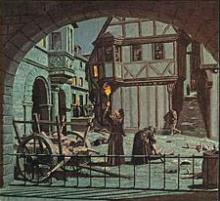
 LISTEN! LISTEN! |
A city in
Europe six hundred years ago. A church bell tolls. The death
wagon rolls through cobbled streets. People cough and convulse.
Crowding; lack of sanitation have brought the dreaded plague.
The life of the Medieval city with its commerce, its art and
architecture, is one of the triumphs of man. But out of the swarming
streets come recurrent disease and disaster. Slowly, man learns
the nature of epidemic. He discovers its treatment and prevention.
With the health of the people safeguarded man's great cities
will grow and flourish. |
| 09. THE VOYAGE OF MAN'S MIND |
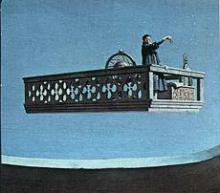
 LISTEN! LISTEN! |
The desire
to know the secrets of the universe is almost as old as man himself.
The Chinese, Arabs and Greeks have all explored the realm of
science. But the real awakening comes as the Renaissance spreads
through Europe five hundred years ago. The writings of Copernicus,
a Polish monk, inspire a whole new way of scientific thinking.
He says that the sun, not the earth, is the center of the universe.
Old superstitions and beliefs are shattered. Copernicus and his
fellow scientists launch man on a voyage of the mind that will
take him beyond the limits of his dreams. |
|
| 10. THE JOURNEY TO THE NEW
WORLD |
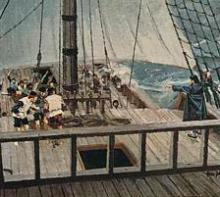
 LISTEN! LISTEN! |
Man's restless
spirit urges him to discover what lies beyond the far horizons.
But he fears the unknown edges of the world and his ships sail
close to shore. Columbus has another idea and he heads three
small ships out into the unknown sea. Food supplies dwindle.
Mutiny threatens. But after thirty-six days Columbus sights San
Salvador; America. Columbus and the brave adventurers like him
snap the physical bounds of man. Their voyages change the whole
course of earth's history. |
| 11. THE TAMING OF A CONTINENT
|
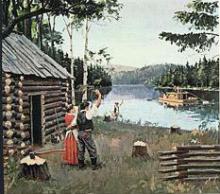
 LISTEN! LISTEN! |
It is three
hundred years after Columbus. Pioneers journey west across the
new world leaving the comfort and security of home; cutting paths
over the Appalachians, moving deep into the heart of the continent.
The world begins to hear about the American spirit. The tough,
self-reliance of individuals in a free society. Our hearts still
beat for the Daniel Boones, the sod busters, the Ohio River flat
boatmen. Their vision of democracy is ours. The wilderness is
not yet tamed. Ahead of us there will always be a frontier. An
endless challenge to the heart and mind of man. |
|
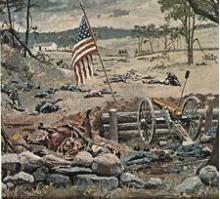
 LISTEN! LISTEN! |
The Civil
War presents the greatest threat to our nation. A grave moral
issue is at stake. But the thunder dies. And as the smoke clears
from Vicksburg, Pickett's Ridge, Chancelorsville; the nation's
reborn. We are one people under God moving ahead together united
and free. Slowly, the wounds of the Civil War heal but the scars
remain. We reaffirm that in unity there is strength and that
the American contribution to man's triumph is the unfaltering
spirit of liberty. The endless struggle for the right of all
men to live together in peace and freedom. |
| 13. MAN'S LEAP TO THE STARS
|
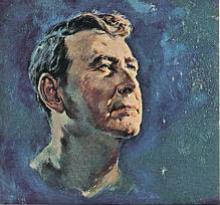
 LISTEN! LISTEN! |
The earth
travels around the sun one hundred times. The pace of human accomplishment
accelerates incredibly. More is achieved in this brief one hundred
years than in all the other ages combined. In a blaze of discovery,
man's mind penetrates inner space seeking the very basis of all
life. He explores outer space, freeing himself from the planet
which has held him for almost two million years. This is man's
nature. Where there is truth, he must find. Where there is danger
he must overcome. Where there is destruction, he must rebuild.
Where there is love, he must protect. This is the triumph of
man. |
|
|
The story of man's progress from
his early beginnings to our own age is a long, complicated story
and anyone might wonder how it could possibly be encompassed
in the 13 scenes that make up The Travelers Exhibit at the New
York World's Fair "The Triumph of Man." The answer
is that it is not meant to display the complete story; no single
exhibit of this kind could do that. It is rather a carefully
chosen series of scenes or episodes that illustrate significant
achievements or triumphs in man's struggle to understand himself
and the world about him and to solve the problems that have at
times threatened to destroy what he had accomplished.
The problems facing those who
designed and created the series of dioramas were difficult ones.
First of all, there was the matter of space. Each scene or episode
required a minimum of square footage to do it justice. And with
the most careful planning, the designers could accommodate no
more than thirteen of them. Since two of these had necessarily
to be reserved for the beginning and end of the sequence, it
left eleven available for all the rest.
Dozens of possibilities, all
with strong claims for their use, were examined, but only those
survived that seemed best to mark the major turning points and
the most fundamental achievements. The basic role of science
in shaping modern life, for example, could not be omitted. It
is symbolized here by the monk, Copernicus, who first questioned
the earth centered view of our universe and opened men's minds
to the fresh investigation of nature that eventually led to the
great triumphs of modern science. The shift from the ancient
and primitive hunting economy to agriculture was a development
in prehistoric times, but one that nevertheless made all subsequent
progress toward civilization possible. The emergence of a social
organization that permitted men to live in large urban centers
where architecture, specialized skills of a high order, commerce,
writing and many other by-products of civilization could flourish,
also marks another turning point.
The remainder were all chosen
for similar reasons. But clearly there is no general consensus
on such decisions, either as to number or theme. Values and judgments
vary in the reading of history and pre-history, and perhaps no
two students might select exactly the same thirteen scenes, even
though many might appear on every list. But if this particular
sequence touches the imagination of the viewer, opens his mind
to the grandeur of the human experiment, and gives him a sense
of the potentiality that exists in man, the exhibit will have
accomplished its purpose.
-
- Harry L. Shapiro, PhD.
- Chairman, Dept.
of Anthropology
- The American Museum
of Natural History
|
|
|
webmasters note: Mike Harrison reports: I thought you
might be interested to know that the man whose voice took visitors
through the exhibit ... is the legendary Peter A. Thomas, who
was one of the original news anchors for CBS Television, even
before the late Walter Cronkite. In the early 1960s, Peter's
voice became so in-demand for commercial and narration work that
he left CBS to do voice-over work full-time. And he still works
today: in addition to various commercials and documentaries,
Peter has been the narrator of 'Forensic Files,' seen on TRU-TV
(formerly Court TV), since the series began. Mike Harrison, via
email 3/10/2010.
|
|
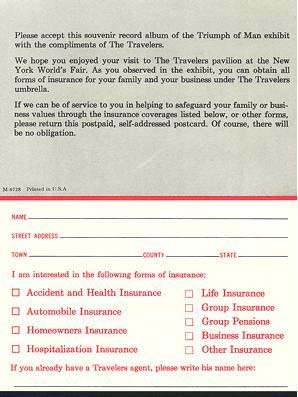
Record Insert Card
|
|
webmasters note: I would like to extend a sincere THANK
YOU to Bradd Schiffman for the many materials he lent and the
time he spent toward the creation of the Travelers Insurance pages at nywf64.com. He has also been an invaluable resource for the audio found on these and other pages. Many thanks, Bradd.
- Bill Young
- July, 2017
-
|
|